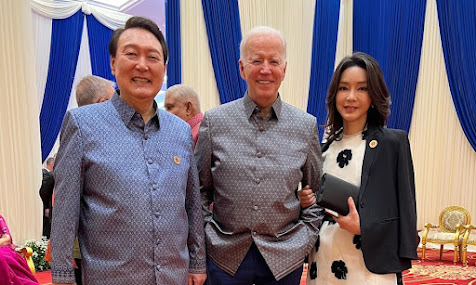Here we go -- literal copy-and-paste of US policy
By Kiji Noh
South Korea’s Indo-Pacific strategy, which was unveiled by President Yoon Suk-yeol during his summit with the Association of Southeast Asian Nations in Phnom Penh last week, amounts to a public declaration that Korea will stand with the US in its hegemonic and strategic rivalry with China.
What Yoon has dubbed “Korea’s Indo-Pacific strategy” resembles the US’ Indo-Pacific strategy in more than name only. The US’ strategy is designed to surround and contain China.
In contrast, the Yoon administration’s Indo-Pacific strategy is noticeably tilted toward the US.
On November 13, Yoon said, “Key values such as regional freedom, human rights and the rule of law must be respected, and attempts to forcibly change the status quo must not be tolerated. The South China Sea needs to be a sea of peace and prosperity, a sea where the rules-based maritime order is protected. The freedoms of navigation and flight must be guaranteed according to the principles of international law, including the UN Convention on the Law of the Sea, and parties must refrain from behavior that would heighten tensions.”
With this overt reference to the freedom of navigation in the South China Sea, Yoon was clearly demonstrating a critical attitude toward China. Emphasizing the freedom of navigation in the South China Sea and opposing attempts to change the status quo by force are narratives that are used by the US and Japan when criticizing China.
See more on this story here

No comments:
Post a Comment